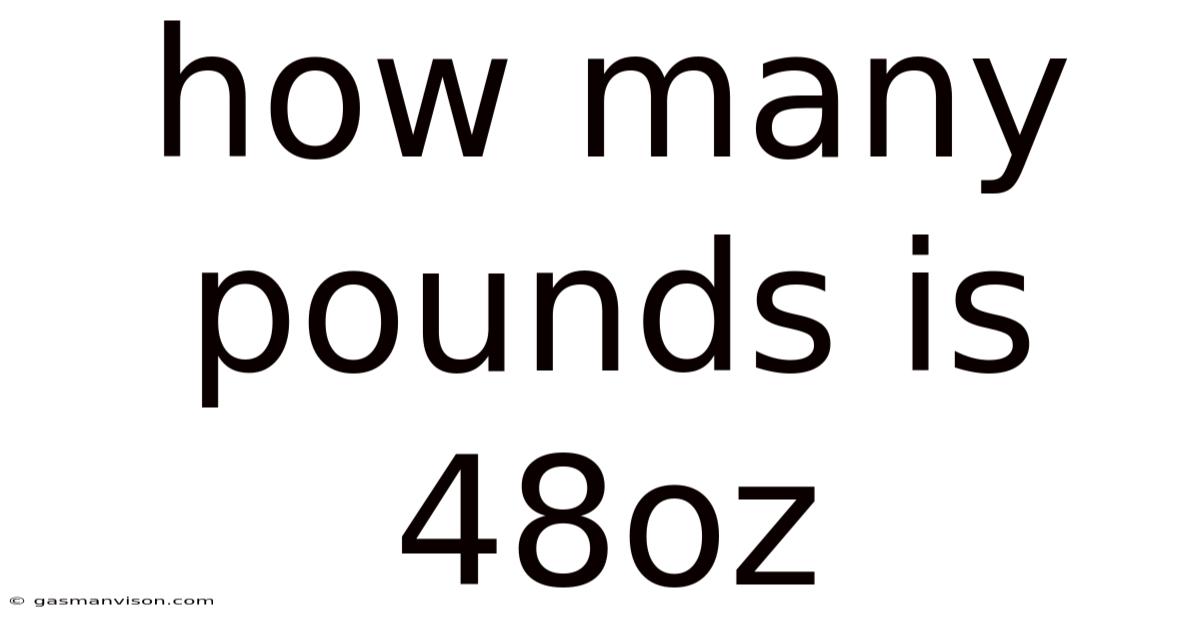How Many Pounds Is 48oz
gasmanvison
Sep 23, 2025 · 4 min read

Table of Contents
How Many Pounds is 48oz? A Comprehensive Guide to Weight Conversions
Knowing how to convert ounces to pounds is a fundamental skill, particularly useful in cooking, baking, shipping, and various other daily activities. This comprehensive guide will not only answer the question "How many pounds is 48oz?" but will also delve into the intricacies of weight conversions, offering a deeper understanding of the imperial system and providing practical applications for everyday use. This article aims to help you master weight conversions and avoid common pitfalls.
Understanding Ounces and Pounds
Before we dive into the conversion, let's establish a clear understanding of ounces (oz) and pounds (lbs). Both are units of weight within the imperial system of measurement, commonly used in the United States and a few other countries.
- Ounce (oz): A relatively small unit of weight. Think of a single ounce as roughly the weight of a slice of bread or a small apple.
- Pound (lbs): A larger unit of weight. A pound is equivalent to 16 ounces. Imagine a pound as the weight of a can of soup or a small bag of sugar.
The Conversion: 48 Ounces to Pounds
The core question: How many pounds is 48oz? The answer is straightforward:
48 ounces is equal to 3 pounds.
This is because there are 16 ounces in every pound (16 oz = 1 lb). To perform the conversion, simply divide the number of ounces by 16:
48 oz / 16 oz/lb = 3 lbs
This simple calculation provides the direct answer. However, understanding the process allows you to confidently convert other weight measurements.
Mastering Weight Conversions: Beyond the Basics
While the conversion of 48 ounces to 3 pounds is simple, let's explore more complex scenarios and practical applications. Understanding these broader applications will solidify your understanding of weight conversions and enhance your ability to solve related problems.
1. Converting Pounds to Ounces:
The inverse operation – converting pounds to ounces – is equally important. To convert pounds to ounces, simply multiply the number of pounds by 16:
- Example: Convert 5 pounds to ounces: 5 lbs * 16 oz/lb = 80 oz
2. Converting Ounces to Grams (Metric System):
While the imperial system is still widely used, understanding the metric system is crucial for global communication and many scientific applications. One ounce is approximately equal to 28.35 grams. Therefore, to convert ounces to grams, you multiply the number of ounces by 28.35:
- Example: Convert 48 ounces to grams: 48 oz * 28.35 g/oz ≈ 1360.8 grams
3. Converting Pounds to Kilograms (Metric System):
Similarly, converting pounds to kilograms involves multiplying the number of pounds by 0.453592:
- Example: Convert 3 pounds to kilograms: 3 lbs * 0.453592 kg/lb ≈ 1.36 kg
4. Working with Fractions of Ounces and Pounds:
Often, you'll encounter weights that aren't whole numbers. For example, you might need to convert 24.5 ounces to pounds. The same principle applies: divide the total ounces by 16:
24.5 oz / 16 oz/lb = 1.53125 lbs
You can round this to 1.5 lbs for most practical purposes.
5. Real-World Applications: Cooking and Baking
Weight conversions are essential in cooking and baking, where precise measurements are crucial for successful outcomes. Recipes often provide ingredients in ounces or pounds, and accurate conversions are necessary to achieve the desired results. Understanding how to convert ounces to pounds ensures you're using the correct amount of each ingredient.
6. Shipping and Logistics:
In shipping and logistics, accurate weight determination is paramount for calculating shipping costs and ensuring proper packaging. Understanding weight conversions helps businesses optimize their shipping processes and avoid unnecessary expenses. Many shipping companies require weight declarations in pounds, making this conversion particularly important.
7. Healthcare and Medicine:
In healthcare and medicine, precise measurements of medications and dosages are critical. Converting between ounces and pounds is important for administering the correct medication based on a patient’s weight.
8. Engineering and Construction:
Many engineering and construction projects require precise weight calculations for structural integrity and safety. Converting between ounces and pounds is vital for ensuring that materials are correctly measured and used.
Avoiding Common Mistakes:
- Incorrect Conversion Factor: Remember that there are 16 ounces in 1 pound, not 12 or any other number. Using the wrong conversion factor will lead to inaccurate results.
- Units: Always pay attention to the units being used (ounces, pounds, grams, kilograms). Misinterpreting the units can lead to significant errors.
- Rounding Errors: When rounding numbers, be mindful of the level of precision required for the specific application. In some cases, rounding to the nearest tenth of a pound might be sufficient, while in others, you might need more precise measurements.
Conclusion:
Understanding how to convert ounces to pounds is a valuable skill applicable across many areas of life. Knowing that 48 ounces equals 3 pounds is just the starting point. By mastering the techniques described in this article, you can confidently tackle various weight conversion scenarios, ensuring accuracy and precision in your daily activities, whether it's baking a cake, shipping a package, or calculating the weight of building materials. Remember to always double-check your calculations and ensure you are using the correct conversion factor to avoid errors. The ability to easily convert between ounces and pounds will improve efficiency and accuracy in numerous situations.
Latest Posts
Latest Posts
-
Homework 2 Angles Of Triangles
Sep 23, 2025
-
120 Km Hr To Mph
Sep 23, 2025
-
What Is 7 Of 200
Sep 23, 2025
-
How Did Barometers Advance Science
Sep 23, 2025
-
Name Three Non Collinear Points
Sep 23, 2025
Related Post
Thank you for visiting our website which covers about How Many Pounds Is 48oz . We hope the information provided has been useful to you. Feel free to contact us if you have any questions or need further assistance. See you next time and don't miss to bookmark.